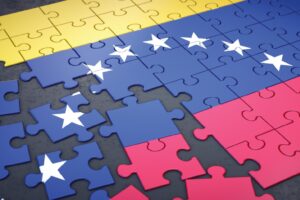
Venezuela’s struggle for democracy has reached a critical juncture, with ripple effects extending far beyond its borders. On February 27, 2025, at 6:30 pm, the SNF Agora Institute and the Hopkins Bloomberg Center will host a discussion featuring David Smolansky, an exiled Venezuelan political leader and current institute Dissident in Residence, who will be there in person, alongside president-elect Edmundo González and democratic opposition leader María Corina Machado, who will join virtually. For those interested in global democracy, human rights, and U.S. foreign policy, the event provides an opportunity to hear directly from those on the frontlines of change.
As Smolansky explained in a recent conversation, last year’s July 28 presidential election was a landmark for Venezuela’s democratic movement. Despite the Maduro regime’s attempts to suppress the results, the opposition not only won but also gathered clear evidence of their victory. Since then, the regime has responded with brutal repression, detaining over 2,000 political opponents and killing at least 28 people who have resisted their rule.
“We want to present what we achieved as a democratic movement,” Smolansky said. “But at the same time, we need to highlight the threat that Maduro’s regime represents—not just for Venezuela, but for the U.S. and the entire hemisphere.”
Beyond electoral suppression, Venezuela is also experiencing a humanitarian crisis. Smolansky described how seven million people are struggling to eat three meals a day, making it the most severe humanitarian crisis in the region. The Inter-American Commission on Human Rights has classified the situation as a state of terrorism, citing government actions that target political opposition and civil society.
The consequences of this crisis extend far beyond Venezuela. With 8 million Venezuelans displaced it has created the largest migration crisis in the Western Hemisphere. Economic instability has fueled corruption and organized crime, with 15% of Venezuela’s economy linked to illicit activities, including drug trafficking and black-market oil sales. Smolansky pointed out that money fuels instability across Latin America.
Venezuela’s shifting alliances also have global implications. Smolansky explained how the country has become a hub for Iranian influence in the hemisphere, collaborating on military projects such as war drones. Growing ties to China and Russia further complicate the security landscape, raising regional and international stability concerns. “We need to take Venezuela more seriously on the international agenda,” he emphasized. “This isn’t just about politics—it’s about security.”
Attendees will hear firsthand from two of the most recognized leaders of Venezuela’s democratic movement. González and Machado have engaged with world leaders and received major human rights awards. Their participation provides a unique chance to gain insight into Venezuela’s challenges and potential paths forward.
A Q&A session will allow attendees to ask questions and engage directly with the speakers after the discussion. Smolansky encouraged participation, saying, “If you’re interested in democracy, human rights, or international relations, this discussion will provide valuable insights. It’s also a chance to consider how the global community can respond to ongoing developments in Venezuela.”
The SNF Agora Institute and Johns Hopkins University have actively fostered discussions on democratic resilience and human rights. Through academic research, public events, and fellowships like Smolansky’s, SNF Agora has provided scholars, activists, and policymakers a platform to engage with these critical issues. Smolansky acknowledged the impact of this work, noting, “Being a visiting fellow at SNF Agora has given me the opportunity to speak in classrooms, lead community workshops, and participate in discussions like this one. Institutions like Johns Hopkins play a crucial role in keeping these issues visible and ensuring that conversations about democracy are happening at the highest levels.” Smolansky offered a final thought for those unsure about attending: Venezuela’s crisis is not just Venezuela’s problem. “We are facing a dictatorship that has stayed in power through force, repression, and corruption,” he said. “But this isn’t just about one country—what happens in Venezuela sets a precedent for democracy worldwide.”
Venezuela’s story is both a warning and an opportunity to learn. This case study shows how forces undermine democracy and how people fight to reclaim it.
Join us at the Hopkins Bloomberg Center in Washington, D.C. RSVP using this link to attend and be part of this important conversation.

